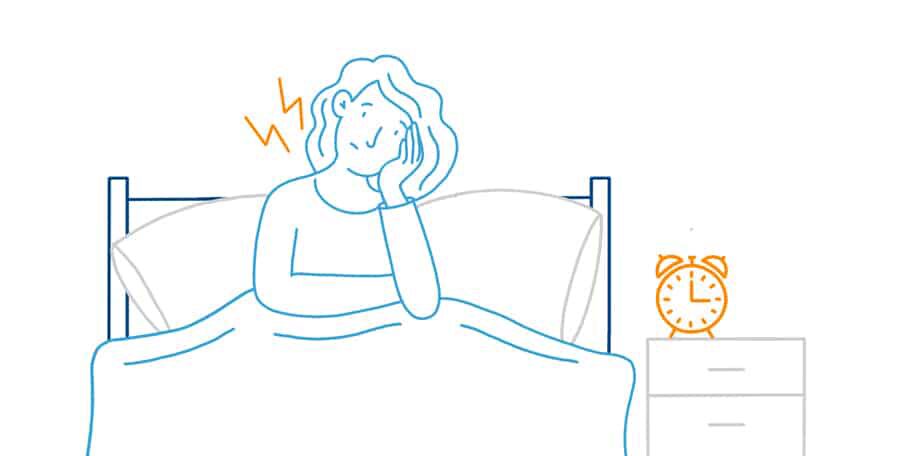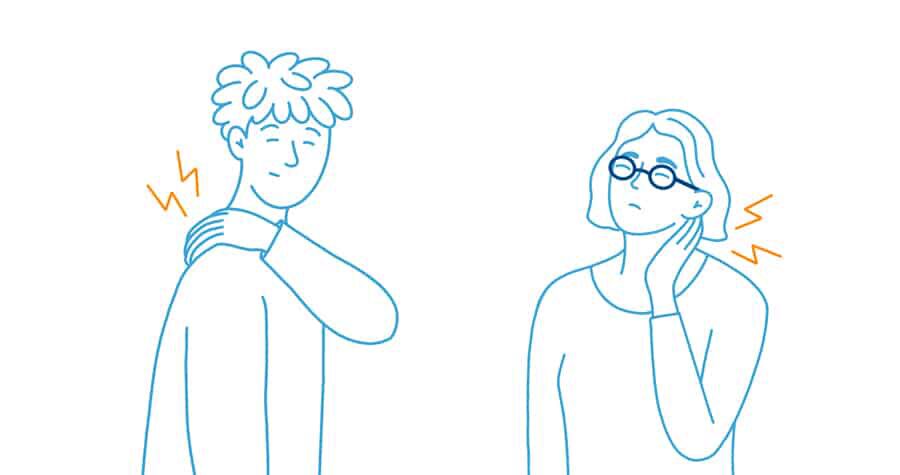Sleeping Well With Fibromyalgia
Disclosure: By clicking on the product links in this article, Mattress Nerd may receive a commission fee at no cost to you, the reader. Read full disclosure statement.
Mattress Nerd consulted Dr. Alaina Rajagopal, MD, PhD, and Vivian Eisenstadt, MAPT, CPT, MASP, to ensure that this article met our editorial standards
Fibromyalgia is a surprisingly common chronic pain condition that affects an estimated 10 million people in the United States. Still, it is often misdiagnosed and misunderstood. One reason is because very little is known about what causes the condition. Diagnosis is difficult and can take years since there are no tests or scans to identify fibromyalgia other than ruling out other conditions. The lapse in diagnosis and the stigma that often accompanies the condition can be frustrating to patients as well as their caregivers.
Fibromyalgia pain runs the gambit as well. It’s often referred to as a widespread ache or described as a sharp, burning, pins-and-needles sensation. Other symptoms that accompany muscle pain can include “brain fog,” fatigue and altered sleep, leading some researchers to suggest that deficient sleep may be linked to the onset of fibromyalgia.

Whether you suffer from fibromyalgia or are a caregiver to someone with the condition, chances are your sleep is suffering. But, it is possible to sleep well despite fibromyalgia.
Tips for Sleeping Better with Fibromyalgia
Sleep problems often accompany a fibromyalgia diagnosis. Unfortunately, inadequate sleep can leave you fatigued and more sensitive to pain. Improving sleep quality can often improve fibromyalgia symptoms. Here are some tips to achieving better quality sleep.
- Create an environment conducive to sleep: Your bedroom should be a sanctuary reserved only for sleep and sex. Remove excess clutter, trade your old sheets for soft, comfortable ones, replace window coverings for blinds that block out unwanted light and use a sound machine to mute outside noise and lull you to sleep.
- Adjust your sleep position: It can be difficult to find a comfortable sleeping position when you are in pain. But the wrong sleep posture can actually cause more pain and discomfort. The best position for most people is on your back with your legs stretched out and arms to your side. The second recommended position is on your side with your legs slightly bent. It is strongly recommended that you don’t sleep on your stomach, as this causes the back to overarch and the neck to twist uncomfortably to the side.
- Use the right pillow: Pillows are designed to keep you comfortable while you sleep. But a pillow that’s either too thin or thick can cause your neck to fall out of alignment with your spine. If you are a back sleeper, use a pillow that allows your head to sink in far enough so that your chin is at a right angle to your chest. If you are a side sleeper, use a thicker pillow that holds your head in alignment with your spine.
- Rely on body pillows: Pillows can be helpful in other places besides under your head. If you are a back sleeper, try placing a pillow or bolster under your knees to reduce strain on your lower back. Side sleepers can place a pillow between their knees to help keep their spine aligned and limit hip pain.
- Invest in a new mattress: An old mattress with little support can worsen pain and even cause new pain. Consider a new mattress made with memory foam or latex. These foams provide extra cushioning for sensitive pressure points at the hips and shoulders.
Additional Considerations with Sleep and Fibromyalgia
Insomnia and Fibromyalgia
Insomnia and fibromyalgia are unfortunate bedfellows. Insomnia is a sleep disorder in which you have difficulty falling asleep or you wake during the night and have a hard time falling back to sleep. The effects of insomnia — fatigue, headache, difficulty concentrating, low energy and mood swings — can also mimic the symptoms of fibromyalgia, further blurring the lines. But, insomnia is so prevalent among people with fibromyalgia that in 2010 the American College of Rheumatology included the sleep disorder among its revised diagnostic criteria for fibromyalgia.
While the cause of sleep problems among those with fibromyalgia is not fully understood, it is believed that people with the condition may have a deficit of the neurotransmitter serotonin, which plays a role in regulating sleep cycle.
Chronic Fatigue and Fibromyalgia
Like fibromyalgia, chronic fatigue syndrome is a medically unexplained illness characterized by disabling fatigue and widespread pain and tenderness. The difference between the two disorders is that with fibromyalgia, the pain is the more predominant symptom where as in chronic fatigue, the overriding symptom is an overwhelming lack of energy.
It is not uncommon for someone to have both fibromyalgia and chronic fatigue syndrome at the same time. In fact, some medical professionals believe that the two are actually the same disorder but expressed in different ways.
Fibromyalgia, Sleep, and Stress
While the cause of fibromyalgia remains uncertain, the condition is often triggered by a stressful event, especially physical or emotional stress. Some possible triggers include injuries, viral infections, undergoing surgery or childbirth, or the loss of a loved one.

This can be a double-edged sword for fibromyalgia sufferers because stress is linked to insomnia and nighttime awakening, which are classic symptoms of fibromyalgia.
Additional Information on Fibromyalgia
Pain and fatigue are the overriding signs of fibromyalgia. According to the Centers for Disease Control and Prevention (CDC), the condition can be accompanied by other symptoms as well:
Symptoms of Fibromyalgia
- Sleep problems, such as insomnia or nighttime wakening
- Mental health problems such as depression and anxiety often accompany chronic diseases
- Headaches and migraines
- Digestive problems, such as abdominal pain, bloating, constipation and irritable bowel syndrome
Causes of Fibromyalgia
It is unknown what causes fibromyalgia, however many health professionals believe there are several factors that contribute to the develop of the condition:
- Abnormal pain messages: One theory is that the central nervous system processes pain messages differently in people with fibromyalgia than people without the condition.
- Chemical imbalances: Research has found people with fibromyalgia have lower levels of the hormones serotonin, noradrenaline and dopamine. These hormones are responsible for regulating mood, appetite, sleep, response to stress, as well as processing pain messages sent by the nerves.
- Sleep problems: Difficulty falling asleep and staying asleep is a symptom of fibromyalgia. One theory is that a sleep deficit can cause extreme fatigue and make you more sensitive to pain, contributing to fibromyalgia.
- Genetics: Genetics may also play a role for some individuals. While the condition isn’t passed directly from patients to children, it does appear to cluster within families.
How is Fibromyalgia diagnosed?
There are no diagnostic tests for fibromyalgia currently available. Doctors often diagnose the condition after investigating a patient’s history, conducting a physical exam and performing X-rays or blood work. The diagnosis is often made after ruling out other medical conditions.
Fibromyalgia Treatment Options
Medications
Opioids, like hydrocodone and OxyContin, were once used by about a third of fibromyalgia sufferers. However, there is little evidence that these medications were helpful and most posed dependency and overdose risks. Current guidelines discourage use of opioids for fibromyalgia. Instead, there are several other treatments found to be safer and more effective at treating the condition:
- Over-the-counter pain relievers such as acetaminophen (Tylenol), ibuprofen (Advil), or naproxen (Aleve) are often recommended as a first-line treatment for pain.
- Antidepressants known as serotonin-noradrenaline reuptake inhibitors (SNRIs) such as duloxetine (Cymbalta) and milnacipran (Savella) as well as the tricyclic antidepressant amitriptyline, are often prescribed to treat nerve pain.
- The muscle relaxant cyclobenzaprine is sometimes used to relieve stiffness caused by muscle spasms.
- Anti-seizure drugs such as gabapentin (Neurontin) have also been shown effective at treating fibromyalgia pain.
- The anticonvulsant Pregabalin (Lyrica) was the first prescription drug approved by the Food and Drug Administration to treat fibromyalgia.
Lifestyle Changes
- Prioritize exercise and movement. Light aerobic exercise not only helps you sleep better at night, it can also reduce stress and fibromyalgia pain. Be sure not to exercise too close to bedtime. Exercising releases endorphins, the “feel good” hormone, which makes you feel more energized. Instead, plan your workouts earlier in the day.
- Develop a nighttime routine. Setting a regular time for going to bed at night and waking in the morning can help reset your circadian rhythm, your body’s internal clock. In time, your body will begin to adjust to the schedule, which will make it easier for you to fall asleep at bedtime and wake up in the morning.
- Consider your eating habits. What you eat during the day can have a big impact on your sleep quality. Avoid caffeine later in the day, including coffee, tea, sodas and chocolate. Also, be aware that some pain relievers or cold remedies may contain caffeine and should be avoided in the late afternoon and evenings. Also cut down on lactose-containing products, such as milk, cheese, and ice cream later in the day, as they can cause abdominal cramping and bloating. And ease up on spicy or fried foods that trigger heartburn.
- Practice Mindfulness. Mindfulness is a type of meditation that involves focusing on being aware of what the body is sensing and feeling in the moment. Research shows that taking time to self meditate and practice mindfulness significantly improves insomnia, sleep quality, sleepiness, and sleep impairment in people with fibromyalgia.
- Kick the smoking habit. There have been hundreds of studies that show the harmful effects of cigarette smoking. More recent studies have shown similar effects with vaping. According to Dr. Mehmet Oz, research suggests that smoking can worsen symptoms of fibromyalgia. Nicotine, found in both cigarettes and e-cigarettes, is also a stimulant and can interfere with sleep.

Be aware of your stressors. Studies have shown that psychological stress not only disrupts sleep, it can make you more sensitive to pain.
Whether you suffer from fibromyalgia or are caring for someone with the condition, knowing the situations that cause you stress and taking steps to avoid, disarm or eliminate them is a first step in reducing stress.
Supplements & Holistic Alternatives
Alternative treatments can offer relief from fibromyalgia symptoms. However, sure to check with your doctor first to be sure a particular therapy does not interfere with medication you are currently taking.
- Melatonin is the body’s natural sleep hormone. Synthetic melatonin is also available as a sleep aid and can help regulate the sleep cycle.
- 5-HTP (5-hydroxytryptophan) is a supplement designed to boost serotonin levels. A deficit of serotonin is linked to fibromyalgia pain.
- St. John’s wort is an herb known as a natural antidepressant. While there is no concrete evidence St. John’s wort can treat fibromyalgia, and may help with depression, a common symptom of fibromyalgia.
- Acupuncture is a centuries-old form of alternative medicine rooted in traditional Chinese medicine. It involves placing needles in certain pressure points in the body. Acupuncture has been shown to effectively treat pain and insomnia, common symptoms of fibromyalgia.
- Relaxation exercises, including mindfulness, meditation and self-hypnosis, can help relax the body and enable the mind to better process stress, which can reduce fibromyalgia pain and improve sleep. According to the medical resource Neurology Advisor, cognitive behavioral therapy increases patients’ confidence in their ability to manage their condition and helps change negative thoughts and feelings regarding their symptoms of pain, fatigue and insomnia.
Cognitive-Behavioral Treatment
Cognitive-behavioral therapy is a form of psychotherapy that has been proven effective at treating a range of conditions including anxiety and depression associated with chronic disorders like fibromyalgia.
According to the medical resource Neurology Advisor, cognitive behavioral therapy increases patients’ confidence in their ability to manage their condition and helps change negative thoughts and feelings regarding their symptoms of pain, fatigue and insomnia.
Final Thoughts
An estimated 10 million Americans suffer from fibromyalgia, a condition that causes widespread pain, fatigue and insomnia. The sleep problems experienced by fibromyalgia sufferers can be a double-edged sword because sleep deficiency can increase pain sensitivity and worsen symptoms of fibromyalgia.
Despite fibromyalgia being a largely misunderstood and misdiagnosed condition, there is strong evidence that people who suffer from this chronic condition can find relief and actually enjoy quality sleep. This, in turn, helps to alleviate their symptoms and improve quality of life.
Meet Our Medical Reviewers
Dr. Alaina Rajagopal, MD, PhD
Dr. Rajagopal is an ER physician with a PhD in public health, virology, and space science. She regularly treat patients in the ER for problems with sleep. She also hosts a podcast called “The Emergency Docs” where she provides reliable medical content for the general public.
Vivian Eisenstadt, MAPT, CPT, MASP
Prior to founding her own practice, Vivian served as a Physical Therapist at Cedars-Sinai Medical Center in both their Outpatient and Spine centers as well as running private clinics in Beverly Hills, CA. She specialized in treating spinal injuries, postural dysfunctions, sprains and strains and general orthopedic injuries


